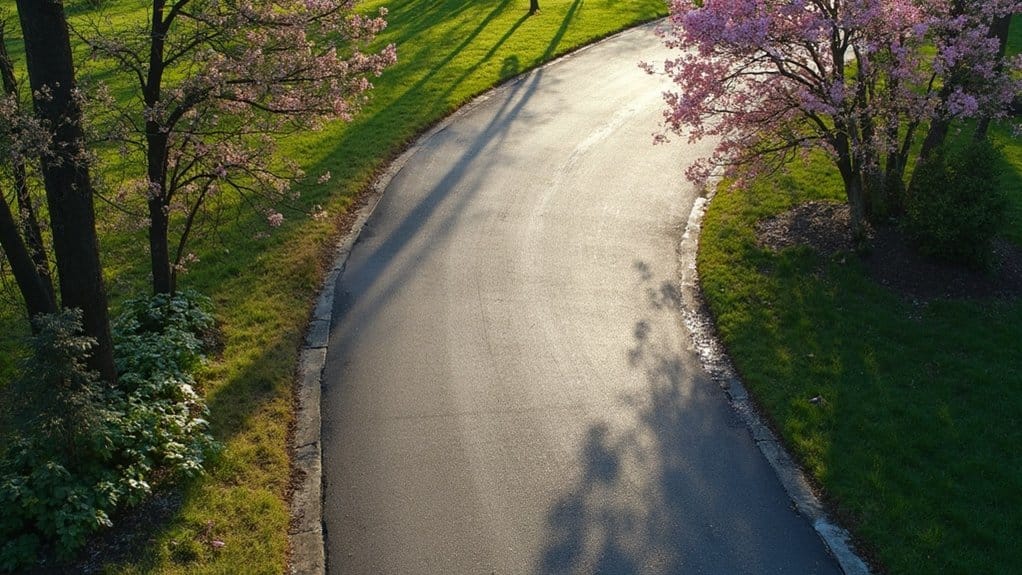Fall is your best bet for paving a driveway in Central PA! You’ll find ideal temperatures between 50-70°F and stable weather patterns from September through early October. The mild conditions allow proper asphalt curing while avoiding spring’s heavy rains and summer’s intense heat. You’ll also benefit from shorter contractor wait times and competitive pricing during this shoulder season. Let’s investigate why timing makes such a huge difference in your paving project’s success.
Key Takeaways
- Early fall (September to early October) offers ideal conditions with mild temperatures between 50-70°F and lower humidity levels.
- Spring (mid-April to early May) provides excellent paving conditions as frost leaves the ground and materials are readily available.
- Summer paving faces challenges with intense heat, faster curing times, and higher contractor demand leading to longer wait times.
- Winter paving should be avoided due to temperatures below 50°F preventing proper asphalt binding and plant closures.
- Off-peak seasons (fall and spring) typically offer better contractor availability and more competitive pricing for paving projects.
Understanding Central PA’s Weather Patterns
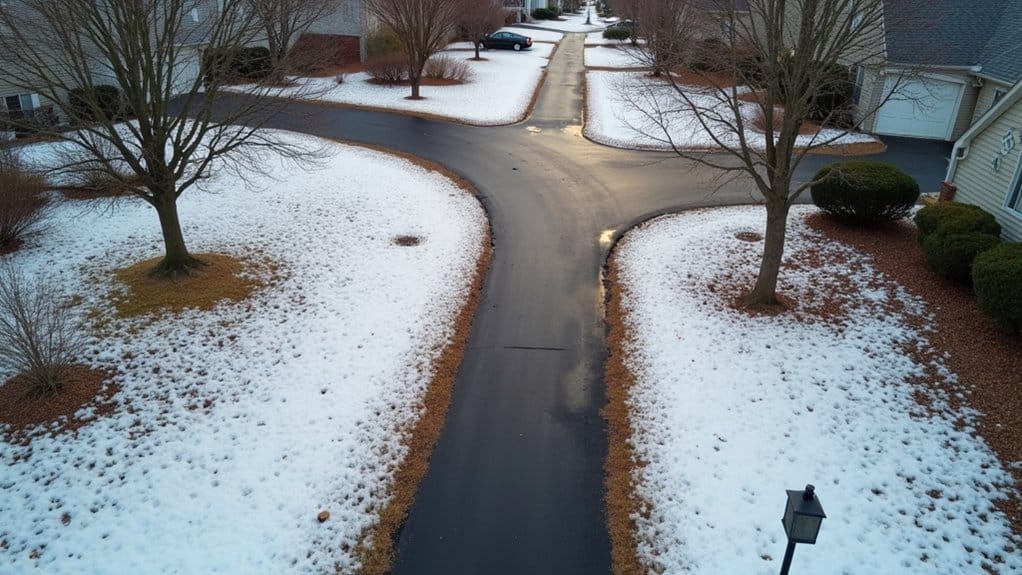
Living in Central Pennsylvania means dealing with four distinct weather patterns each year. Each season brings unique challenges that affect your paving decisions.
Spring weather in Central PA is unpredictable! You’ll experience frequent rain showers and temperature swings between 35-65°F. These conditions make scheduling outdoor projects tricky.
Summer brings hot, humid days with temperatures reaching 85-95°F. You’ll notice thunderstorms pop up frequently from June through August.
Fall delivers crisp mornings and mild afternoons. Temperatures typically range from 45-70°F with less rainfall than spring.
Winter hits hard with freezing temperatures and snow! You can expect readings between 15-35°F from December through February.
Understanding these seasonal trends is essential for your paving project. Central PA’s weather patterns directly impact when you should schedule your driveway installation. Additionally, quality paving services can make a significant difference in how well your driveway withstands seasonal changes.
Spring Paving: Advantages and Challenges
Spring offers excellent opportunities for your driveway paving project! As temperatures rise and frost leaves the ground, you’ll find ideal conditions for asphalt work.
Spring maintenance becomes easier when the ground isn’t frozen solid. You’re also getting ahead of summer’s intense heat waves.
However, spring brings unique challenges to take into account:
- Frequent rain showers can delay your project
- Ground may still be too soft from winter thaw
- Seasonal preparation needs extra attention for proper drainage
The sweet spot for spring paving falls between mid-April and early May. This timing lets you avoid most rainfall while ensuring proper ground conditions. Additionally, ensuring proper drainage during this period can help prevent future issues with your paved surface.
Your contractor can better assess soil stability and complete seasonal preparation steps during this window. Plan ahead – the best contractors fill their schedules quickly!
Summer as Prime Paving Season
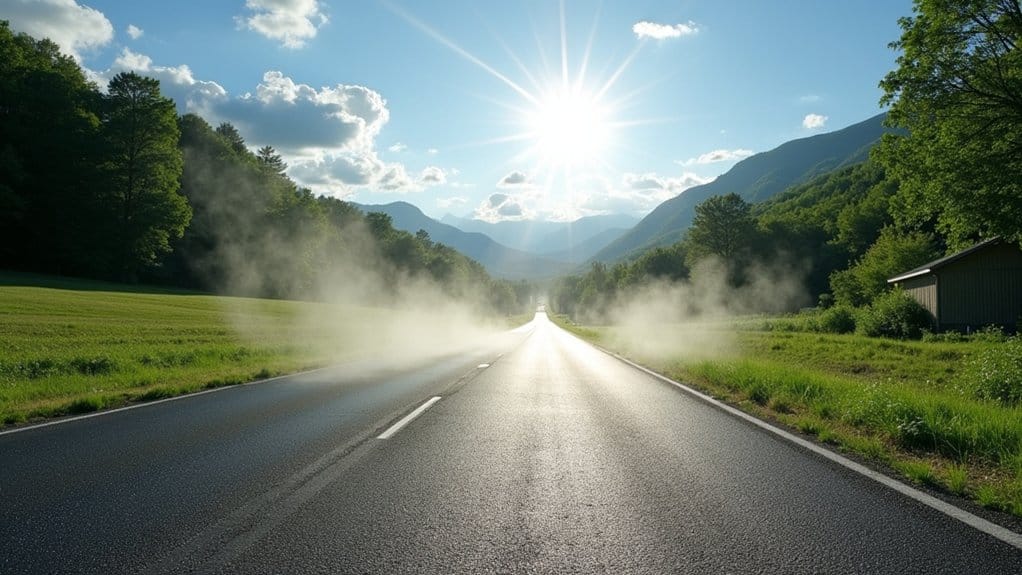
While summer may seem like an obvious choice, it’s actually not the ideal season for paving in Central PA!
The intense heat and humidity can create major challenges for your paving project. Summer paving often leads to faster curing times – but that’s not always good news! The asphalt can become too soft and difficult to work with when temperatures soar above 90°F.
Your summer maintenance plans might need adjusting.
Here’s why:
- Extreme heat can cause surface imperfections
- Higher chances of thunderstorms disrupting work
- Contractor schedules are usually packed
- Materials cost more during peak season
You’ll also face longer wait times since everyone wants their driveways paved in summer. Most contractors in Central PA are booked weeks (sometimes months) in advance during June through August. Consider scheduling your paving project during spring or fall instead! Additionally, regular maintenance such as seal coating can help extend the lifespan of your pavement and protect your investment.
Fall Weather Conditions for Asphalt Work
Fall brings perfect conditions for your Central PA paving project! The mild temperatures and lower humidity create an ideal environment for asphalt installation. You’ll want to schedule your fall maintenance before the first frost arrives.
| Weather Factor | Impact on Paving | Best Conditions |
|---|---|---|
| Temperature | Curing time | 50-70°F |
| Humidity | Surface bonding | Below 60% |
| Precipitation | Project delays | Clear skies |
Your seasonal preparation should start in early fall – typically September or early October. The ground remains warm enough for proper asphalt curing. Yet it’s cool enough for crews to work efficiently. The stable weather patterns mean fewer rain delays too! Additionally, it’s advisable to choose a reputable contractor with over 10 years of experience to ensure high-quality workmanship.
Pro tip: Book your paving contractor early! The perfect fall conditions make this a busy season for driveway installations.
Winter Limitations and Restrictions
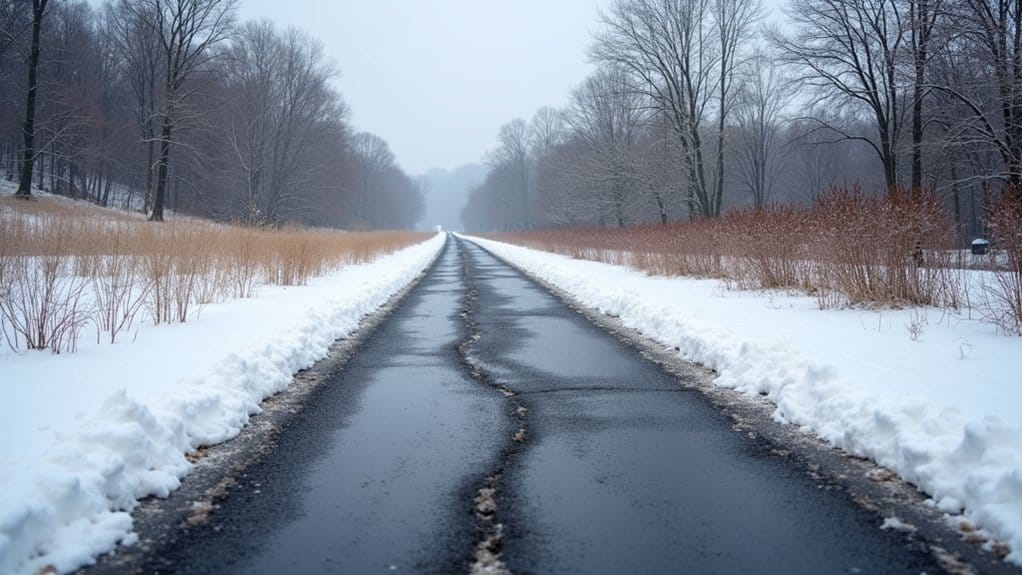
The harsh winter months bring major challenges for asphalt paving in Central PA.
You’ll face serious obstacles when trying to pave during winter weather. Temperatures below 50°F make it impossible for asphalt to bind properly. Your paving equipment won’t operate efficiently in freezing conditions either.
Key Winter Restrictions:
- Asphalt plants typically close from December through March
- Snow and ice prevent proper surface preparation
- Ground frost creates unstable base conditions
- Cold temperatures make asphalt harden too quickly
Don’t risk your investment by paving in winter! The results will be disappointing – with cracking, uneven surfaces, and poor longevity. Regular maintenance is crucial to extend your driveway’s lifespan and prevent costly repairs.
Your contractor’s paving equipment needs warmer conditions to deliver quality results. Save your project for spring when temperatures rise above 50°F consistently. You’ll get much better value for your money!
Temperature Requirements for Proper Curing
Proper asphalt curing demands specific temperature conditions for outstanding results. You’ll want consistent temperatures between 50-90°F for ideal curing of your new driveway.
Watch out for those tricky temperature fluctuations! Extreme heat or cold can seriously impact how well your asphalt sets. The best conditions occur during spring and fall months in Central PA when temperatures are moderate.
Your fresh asphalt needs at least 24 hours to cure initially. But here’s what many don’t know – complete curing takes 6-12 months! During this time, keep the surface temperature above 50°F whenever possible.
Pro tip: Schedule your paving project when the forecast shows several days of stable temperatures. This gives your new driveway the best chance for proper curing and long-lasting performance. Additionally, working with a fully licensed and insured paving company ensures you receive expert advice on the best timing for your project.
Moisture Impact on Paving Success

Along with temperature control, moisture plays a major role in your paving project’s success. Excessive moisture can destroy your new driveway before it even cures! You’ll want to monitor moisture levels carefully before and during installation.
| Moisture Condition | Impact on Paving | Action Needed |
|---|---|---|
| Heavy Rain | Severe Damage | Reschedule Project |
| Light Drizzle | Moderate Risk | Wait 24 Hours |
| Dry Ground | Ideal Conditions | Proceed with Paving |
Don’t let your investment go to waste! Check the weather forecast for a 3-day dry period before starting. Proper moisture management guarantees maximum paving durability. Your contractor should test ground moisture content before beginning work. Additionally, keeping up with regular maintenance services can help prevent issues related to moisture in the future.
Pro tip: Schedule your paving project during a dry spell. You’ll get better results and avoid costly repairs down the road!
Scheduling Around Regional Weather Events
When planning your Central PA paving project, you’ll need to dodge our region’s notorious weather events!
Our regional climate presents unique challenges that can affect your driveway’s success.
Spring Storms (March-May):
- Watch for heavy rain forecasts
- Schedule around potential flooding
- Allow extra dry days between storms
Summer Weather (June-August):
- Take advantage of best paving temperatures
- Book early – it’s peak paving season!
- Monitor humidity levels carefully
Fall Considerations (September-November):
- Work before frost sets in
- Avoid wet leaf accumulation
- Plan around harvest traffic
Winter Warning (December-February):
- Modern paving techniques can work in cold
- Expect longer curing times
- Higher costs for winter projects
Smart scheduling tip: Book your project 3-4 weeks in advance during peak season. This guarantees you’ll get ideal conditions for success! Additionally, consider the benefits of sealcoating services to enhance your pavement’s longevity and durability.
Material Availability Throughout the Year
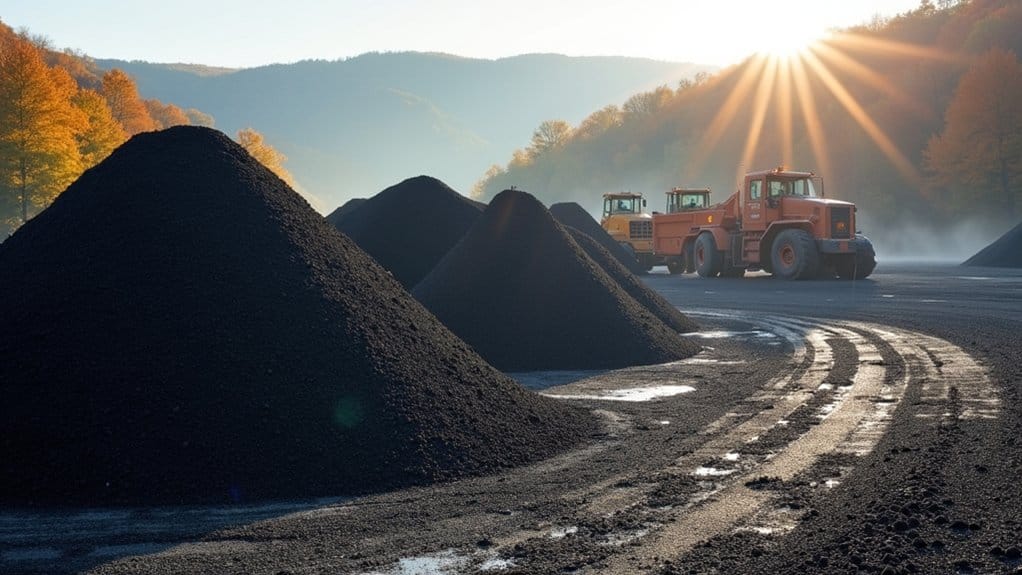
The availability of paving materials shifts dramatically as seasons change in Central PA.
Material Sourcing Peaks & Valleys:
- Spring brings abundant fresh materials with competitive pricing.
- Summer sees high demand but consistent supply channels.
- Fall offers excellent material sourcing opportunities.
- Winter creates limited availability due to plant closures.
Seasonal Pricing Impact:
You’ll find the best material rates during spring and fall shoulder seasons.
Many suppliers reduce their prices to maintain steady business during these changeover periods.
Your contractor can access premium asphalt mixes at better rates!
Additionally, obtaining a fast, free quote can help you better understand your project’s specific material needs.
Smart Planning Tips:
- Book 2-3 months ahead during peak season.
- Request quotes from multiple suppliers.
- Consider bulk-buying opportunities in March-April.
- Lock in prices early to avoid mid-season increases.
Watch for special promotions during slower periods when suppliers need to move inventory!
Local Contractor Peak Seasons
Paving contractors in Central PA experience their busiest period from late May through September.
During peak season, you’ll face higher prices and limited contractor availability. Smart planning can help you steer through these challenges and save money!
Consider these key factors about contractor peak seasons:
- Early spring bookings can lock in better seasonal pricing.
- You’ll wait 4-6 weeks longer for project starts during peak months.
- Most contractors charge 15-25% more during their busiest times.
- Emergency repairs cost extra during peak season due to packed schedules.
The best strategy? Book your paving project during off-peak months!
You’ll find more flexible scheduling options from October through April. Contractors are enthusiastic for work during slower periods. They often offer competitive rates to keep their crews busy. Additionally, paving during off-peak months can lead to better customer satisfaction as contractors have more time to focus on quality service.
Take advantage of these seasonal opportunities!
Conclusion
Summer is your golden opportunity for driveway paving in Central PA! Like a flower blooming in perfect conditions, your new driveway needs the right environment to thrive. You’ll want temperatures between 50-90°F and minimal rain – that’s why June through August is your sweet spot. Don’t let your dream driveway melt away! Schedule your paving project during these prime months for the best long-lasting results.
